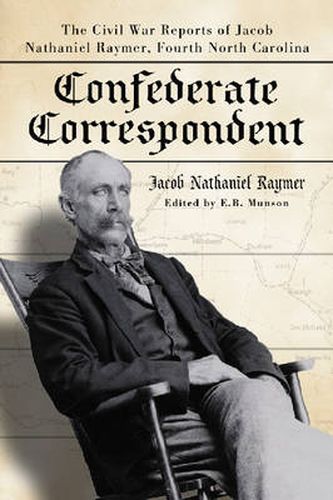Readings Newsletter
Become a Readings Member to make your shopping experience even easier.
Sign in or sign up for free!
You’re not far away from qualifying for FREE standard shipping within Australia
You’ve qualified for FREE standard shipping within Australia
The cart is loading…






This title is printed to order. This book may have been self-published. If so, we cannot guarantee the quality of the content. In the main most books will have gone through the editing process however some may not. We therefore suggest that you be aware of this before ordering this book. If in doubt check either the author or publisher’s details as we are unable to accept any returns unless they are faulty. Please contact us if you have any questions.
Soon after North Carolina seceded from the Union in May 1861, Jacob Nathaniel Raymer enlisted in the Confederate Army as a private and musician and was mustered in on June 7, 1861, pledged to serve the duration of the war. A young man with a talent for keen observation who had pledged to keep those back home informed of the movements of Company C and the Fourth Regiment, he faithfully wrote letters - often signed simply as ‘Nat’ - to the
Carolina Watchman
and the
Iredell Express , newspapers published in Statesville, North Carolina.In his capacity as an embedded journalist, Raymer witnessed and chronicled the great battles of the Civil War, including Sharpsburg, Fredericksburg, Chancellorsville, Gettysburg and, finally, Lee’s surrender at Appomattox. Unlike other contemporary correspondence, rather than being directed to an individual, Nat’s letters were intended for the broader audience of area newspapers readers and portrayed the dogged determination of the southern soldiers in a descriptive style whose sense of immediacy functioned to bring the war and all its harsh realities home to his readers. The collection is transcribed primarily from the two newspapers and is complemented by brief narratives that place the letters within the Fourth Regiment’s movements. Raymer’s postwar experience is also documented through his personal correspondence, which follows him back home and to his eventual settlement in Texas, where he died in 1909 at age 72.
$9.00 standard shipping within Australia
FREE standard shipping within Australia for orders over $100.00
Express & International shipping calculated at checkout
This title is printed to order. This book may have been self-published. If so, we cannot guarantee the quality of the content. In the main most books will have gone through the editing process however some may not. We therefore suggest that you be aware of this before ordering this book. If in doubt check either the author or publisher’s details as we are unable to accept any returns unless they are faulty. Please contact us if you have any questions.
Soon after North Carolina seceded from the Union in May 1861, Jacob Nathaniel Raymer enlisted in the Confederate Army as a private and musician and was mustered in on June 7, 1861, pledged to serve the duration of the war. A young man with a talent for keen observation who had pledged to keep those back home informed of the movements of Company C and the Fourth Regiment, he faithfully wrote letters - often signed simply as ‘Nat’ - to the
Carolina Watchman
and the
Iredell Express , newspapers published in Statesville, North Carolina.In his capacity as an embedded journalist, Raymer witnessed and chronicled the great battles of the Civil War, including Sharpsburg, Fredericksburg, Chancellorsville, Gettysburg and, finally, Lee’s surrender at Appomattox. Unlike other contemporary correspondence, rather than being directed to an individual, Nat’s letters were intended for the broader audience of area newspapers readers and portrayed the dogged determination of the southern soldiers in a descriptive style whose sense of immediacy functioned to bring the war and all its harsh realities home to his readers. The collection is transcribed primarily from the two newspapers and is complemented by brief narratives that place the letters within the Fourth Regiment’s movements. Raymer’s postwar experience is also documented through his personal correspondence, which follows him back home and to his eventual settlement in Texas, where he died in 1909 at age 72.